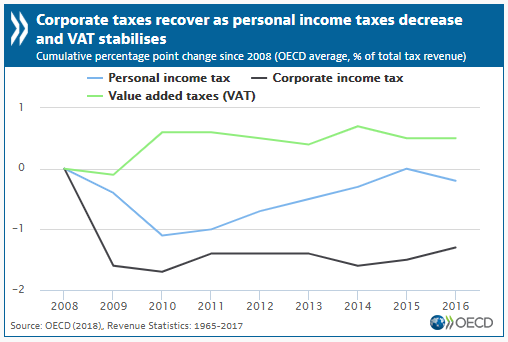Tax revenues in advanced economies have continued to increase; OECD research

Tax revenues in advanced economies have continued to increase, with taxes on companies and personal consumption representing an increasing share of total tax revenues, according to new OECD research.
The 2018 edition of the OECD’s annual Revenue Statistics publication shows that the OECD average tax-to-GDP ratio rose slightly in 2017, to 34.2%, compared to 34.0% in 2016. The OECD average is now higher than at any previous point, including its earlier peaks of 33.8% in 2000 and 33.6% in 2007.
An increase in tax-to-GDP levels was seen in 19 of the 34 OECD countries that provided preliminary data for 2017, while tax-to-GDP levels fell in the remaining 15 countries. Tax-to-GDP levels are now higher than their pre-crisis levels in 21 countries, and all but eight (Canada, Estonia, Hungary, Ireland, Lithuania, Norway, Slovenia and Sweden) have experienced an increase in their tax-to-GDP ratio since 2009.
Consumption Tax Trends 2018 highlights that value-added tax (VAT) revenues continue to be the largest source of consumption tax revenues in the OECD, and have now reached an all-time high of 6.8% of GDP, representing 20.2% of total tax revenue, on average in 2016.
After experiencing an upward trend since the economic crisis, standard VAT rates stabilised at 19.3% on average in 2014 and have remained at this level since. Ten countries now have a standard VAT rate above 22%, against only four in 2008. Two countries (Greece and Luxembourg) increased their standard VAT rate between January 2015 and January 2018, while two countries (Iceland and Israel) reduced their standard VAT rate over this period.
With less scope to raise already relatively high standard VAT rates, countries are increasingly implementing or considering base broadening measures to protect or increase VAT revenues. This includes increasing some reduced VAT rates, limiting or narrowing their scope and curbing VAT exemptions. A growing number of tax authorities have implemented or are considering implementation of measures to tackle the challenges of collecting VAT on the ever-rising volume of digital sales, including sales by offshore vendors, in line with new OECD standards.

Revenue statistics also contains a Special Feature that measures the convergence of tax levels and tax structures in OECD countries between 1995 and 2016. The Special Feature highlights ongoing convergence across the OECD toward higher tax levels, with greater reliance on corporate income tax (CIT), VAT and social security contributions, and a slight downward shift in personal income taxes.
The latest data confirms this convergence, with CIT, as a share of total taxes, now reaching its highest levels since the global economic and financial crisis, increasing on average from 8.8% in 2015 to 9.0% in 2016. CIT revenues are still lower than their peak in 2007 (11.1% of total revenues), but are now higher than at any point since 2009 (8.7%). Between 2015 and 2016, personal income tax revenues decreased from 24.1% to 23.8% of total tax revenues.
The increase in the average share of CIT was driven by increases in revenues from CIT in 23 countries in 2016, while the fall in personal income tax was seen in 20 countries.
In 2017, the largest increases in the overall tax-to-GDP ratio relative to 2016 were seen in Israel (1.4 percentage points, due to tax reforms which increased revenues from taxes on income) and in the United States (1.3 percentage points; due to the one-off deemed repatriation tax on foreign earnings, which increased revenues from property taxes). Nineteen countries had increases but no other country had an increase of more than one percentage point.
Ten OECD countries decreased their tax-to-GDP ratios in 2016, relative to 2015, with the largest decreases observed in Austria and Belgium. There were no decreases of more than one percentage point.
Detailed Country Notes provide further data on national tax burdens and the composition of the tax mix in OECD countries.
Source: OECD



























